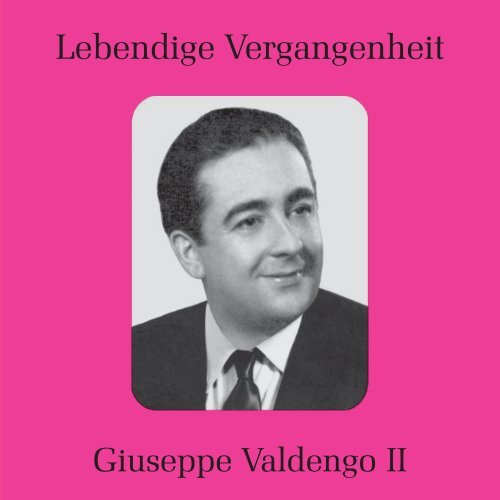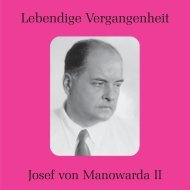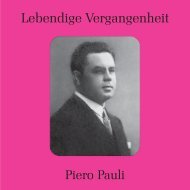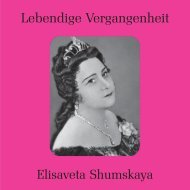Lebendige Vergangenheit - Preiser Records
Lebendige Vergangenheit - Preiser Records
Lebendige Vergangenheit - Preiser Records
Erfolgreiche ePaper selbst erstellen
Machen Sie aus Ihren PDF Publikationen ein blätterbares Flipbook mit unserer einzigartigen Google optimierten e-Paper Software.
<strong>Lebendige</strong> <strong>Vergangenheit</strong><br />
Giuseppe Valdengo II
Giuseppe Valdengo wurde am 24. Mai 1914 in Turin/Piemont geboren. Am Turiner<br />
Konservatorium schloß er ein Oboen-Studium ab und studierte weiters Klavier, Violine<br />
und Englisch Horn. Der Komponist Franco Alfano, der damalige Direktor des Konservatoriums,<br />
regte ihn dazu an, seine Stimme ausbilden zu lassen. Nach einem Studium<br />
bei Michele Accorinti in Turin debütierte Valdengo 1937 als Sharpless in „Madama<br />
Butterfly“ am Teatro Sperimentale in Alessandria. Wenig später sang er in Bologna den<br />
Marcello in „La Bohème“ und trat in Parma als Figaro in „Il Barbiere di Siviglia“ auf,<br />
allerdings noch nicht am Teatro Regio, sondern an einer kleineren Bühne. Am Teatro<br />
Regio selbst sang er dann sehr erfolgreich den Figaro in „Le Nozze di Figaro“. Sein<br />
Debut an der Mailänder Scala, das für 1939 geplant war, wurde vom Ausbruch des<br />
Krieges vorerst vereitelt. Valdengo wurde in die Armee einberufen und als Oboist in<br />
einer Militärkapelle eingesetzt. Über sein tatsächliches Scala-Debut gibt es widersprüchliche<br />
Angaben: das Auftrittsverzeichnis des Opernhauses führt ihn erstmals im<br />
Frühjahr 1941 in der kleinen Rolle des Baron Douphol in „La Traviata“ (mit Mafalda<br />
Favero in der Titelrolle und Giovanni Malipiero als Alfredo). In der darauffolgenden<br />
Saison war er als Mandarin in „Turandot“, Franz in „Lodoletta“, Pietro in<br />
„Hänsel und Gretel“ und Sharpless in „Madama Butterfly“ zu hören, sowie 1943<br />
wieder als Douphol in „La Traviata“. Erst 1953 kehrte er als Manfredo in „L’Amore<br />
dei tre Re“ an die Scala zurück und sang dort 1955 noch einmal den Marcello in<br />
„La Bohème“.<br />
1946 trat er im Rahmen einer Nordamerika-Tournee als Sharpless in „Madama Butterfly“<br />
an der New York City Center Opera auf. An der Metropolitan Opera debütierte er<br />
1947 als Tonio in „I Pagliacci“. Er blieb für die folgenden sieben Spielzeiten Mitglied<br />
der Met und war in insgesamt rund 90 Vorstellungen unter anderem als Marcello in<br />
„La Bohème“, Vater Germont in „La Traviata“, Ford in „Falstaff“, Amonasro in<br />
„Aida“, Graf in „Le Nozze di Figaro“, Enrico in „Lucia di Lammermoor“, Lescaut in<br />
„Manon Lescaut“ und Belcore in „L’Elisir d’Amore“ zu hören.<br />
Arturo Toscanini hatte sich zu dieser Zeit zwar aus der Opernwelt zurückgezogen und<br />
widmete sich verstärkt dem symphonischen Repertoire, aber er verfolgte dennoch
Radioübertragungen und war über die aktuelle Lage der Opernwelt bestens unterrichtet.<br />
1947 suchte der Dirigent für die „Otello“-Produktion der NBC einen geeigneten Sänger<br />
für die Rolle des Iago. Nach einigen erfolglosen auditions ließ er Valdengo mitteilen,<br />
daß er ihn zu hören wünsche: „Un bel colore di voce all’antica.“ („Eine schöne,<br />
‘altmodische’ Stimmfarbe.“), urteilte er und erklärte sich bereit, die Rolle mit Valdengo<br />
höchstpersönlich einzustudieren. 1949 folgte unter Toscanini die Einspielung von<br />
„Aida“ und im Jahr darauf sang er unter dem Dirigenten in der „Falstaff“-Produktion,<br />
die für alle Zeiten Maßstäbe gesetzt hat. Zwischen Toscanini und Valdengo entwickelte<br />
sich eine herzliche Freundschaft, die bis zu Toscaninis Tod andauerte. Viele unterhaltsame<br />
und zugleich tiefgründige Anekdoten über seine Erfahrungen und Gespräche mit<br />
Toscanini erzählt Valdengo in seinen Büchern „Ho cantato con Toscanini“ und „Scusi,<br />
conosce Toscanini?“<br />
1954 verließ Valdengo die Metropolitan Opera. Ein nicht unwesentlicher Grund dafür<br />
dürfte gewesen sein, daß dem Opernhaus mit Leonard Warren, Robert Merrill, John<br />
Brownlee, Frank Guarrera und Frank Valentino ausreichend erstklassige „Hausbaritone“<br />
zur Verfügung standen. Zusätzlich schienen interne Eifersüchteleien im Spiel gewesen<br />
zu sein: Warren war nie wirklich über die Kränkung hinweggekommen, daß Toscanini<br />
nicht ihn, sondern Valdengo für die Titelpartie des Falstaff gewählt hatte. Valdengo<br />
erinnerte sich, wie ihm der Maestro belustigt erzählte, daß Warren ihm für die<br />
„Falstaff“-Produktion ein Vorsingen geradezu aufgedrängt hätte, das ihm Toscanini<br />
schließlich nicht verwehren konnte. Was der Dirigent an Warren für die Partie des<br />
Falstaff vermißte, waren vor allem Spritzigkeit und musikalische Wandlungsfähigkeit<br />
sowie eine knackige und beißende („mordente“, wie die Italiener sagen) Diktion.<br />
Jedenfalls machte Warren seinem italienischen Bariton-Kollegen an der Met das<br />
Leben schwer.<br />
Valdengo erinnert sich auch, daß das Privileg, einer der Lieblingsbaritone von Toscanini<br />
zu sein, für ihn beinahe zu einer Art Stigma wurde. Viele große Dirigenten, er erwähnt<br />
vor allem Victor De Sabata, machten ihm diese enge Zusammenarbeit gleichsam zum<br />
Vorwurf und äußerten sich negativ über Toscanini, den Valdengo eisern verteidigte
und sich dadurch mancherlei Feinde schaffte. Valdengo zitiert auch den Dirigenten<br />
Fritz Busch, der festgestellt haben soll: „Lieber Valdengo, immer wenn Sie singen, spürt<br />
man die Klauen Toscaninis.“<br />
Valdengo verlegte den Schwerpunkt seiner Karriere nach Italien. Am Teatro Regio<br />
von Parma sang er etwa die Titelrolle in Borodins „Fürst Igor“, am gleichnamigen<br />
Opernhaus von Turin den Michonnet in „Adriana Lecouvreur“ und am Opernhaus von<br />
Rom wirkte er 1961 in der Uraufführung von Renzo Rossellinis Oper „Lo Sguardo dal<br />
Ponte“ mit. Bei den Festspielen von Glyndebourne sang er 1955 den Don Giovanni<br />
und war im Rahmen von Gastspielen unter anderem auch in London, Paris, Wien,<br />
Buenos Aires, Rio de Janeiro, San Francisco, Cincinnati und Philadelphia zu hören.<br />
Später übernahm er auch buffo-Partien wie den Dulcamara in „L’Elisir d’Amore“ oder<br />
den Giacomo in „Fra Diavolo“. Mit Ende der sechziger Jahre klang seine Karriere<br />
langsam aus und er widmete sich intensiv der Ausbildung junger Sänger.<br />
Die Aufnahmen Valdengos (sowohl live als auch im Studio) und auch Kritiken über<br />
seine Opernauftritte offenbaren beträchtliche Schwankungen was gesangliche und<br />
interpretatorische Qualität betrifft: die Behauptung, Valdengo hätte seine mit Abstand<br />
besten künstlerischen Leistungen unter dem Dirigat Toscaninis erbracht, ist nur<br />
schwer von der Hand zu weisen. In den drei Gesamtaufnahmen strotzen die Rollenporträts<br />
des Baritons nur so von Farben, Nuancen und feinen Schattierungen. In späteren<br />
Aufnahmen treten diese Feinheiten zugunsten einer Neigung zu exzessivem forte-<br />
Singen zunehmend in den Hintergrund. Wie wichtig ein Dirigent ist, der Sänger<br />
inspiriert und auch „an die Kandare“ nimmt, läßt sich am Beispiel Valdengos hervorragend<br />
demonstrieren.<br />
Auch im Tonfilm hatte er sich 1951 in „The Great Caruso“ mit der Darstellung von<br />
Antonio Scotti verewigt. Ein kleines Detail am Rande: der ehemalige Direktor der<br />
Metropolitan Opera, Edward Johnson, hatte Valdengo Scottis Iago-Kostüm geschenkt,<br />
das dieser später dem Toscanini-Museum in Parma überlassen hat, wo es heute noch<br />
zu sehen ist.<br />
Laura Semrau
Giuseppe Valdengo was born on May 24th 1914 in Turin in Piemont. At the Conservatory<br />
of Turin he completed his oboe studies and also studied the piano, violin and cor<br />
anglais. It was the composer, Franco Alfano, then director of the Conservatory, who<br />
encouraged him to have his voice professionally trained. After vocal studies under<br />
Michele Accorinti in Turin, Valdengo made his operatic debut in 1937 as Sharpless in<br />
“Madama Butterfly” at the Teatro Sperimentale in Alessandria. A little later he appeared<br />
in Bologna as Marcello in “La Bohème” and in Parma - not yet at the Teatro Regio but<br />
at a minor stage - as Figaro in “Il Barbiere di Siviglia”. At the Teatro Regio he enjoyed<br />
great success as the “other” Figaro by Mozart. His debut at Milan’s Teatro alla Scala,<br />
scheduled for 1939, was prevented by the outbreak of War. Valdengo was<br />
called up into the army and played the oboe in a military band. There are various dates<br />
given for his actual debut at the Scala: the annals of the Scala list his name for the first<br />
time in 1941 in the role of Baron Douphol in “La Traviata” (with Mafalda Favero in<br />
the title role and Giovanni Malipiero as Alfredo). In the following season he was<br />
heard in the small roles of the Mandarin in “Turandot”, Franz in “Lodoletta”, the<br />
Father in “Hänsel und Gretel” and Sharpless in “Madama Butterfly” and in 1943,<br />
again as Baron Douphol. Only in 1953 did he return to the Scala, as Manfredo in<br />
“L’Amore dei tre Re”, and in 1955 he sang Marcello there in “La Bohème”.<br />
During a tour of North America he appeared at the New York City Center Opera as<br />
Sharpless. His debut at the Metroplitan Opera followed in 1947 as Tonio in “I Pagliacci”.<br />
For the following seven seasons he remained in the ensemble of the Met, where he<br />
sang a total of almost ninety performances in the roles of Marcello in “La Bohème”,<br />
Germont père in “La Traviata”, Ford in “Falstaff”, Amonasro in “Aida”, the Count in<br />
“Le Nozze di Figaro”, Enrico in “Lucia di Lammermoor”, Lescaut in “Manon<br />
Lescaut” and Belcore in “L’Elisir d’Amore”, among others.<br />
In 1947 Arturo Toscanini was looking for a suitable singer for the role of Iago in his<br />
“Otello” recording for NBC. After a series of dissatisfying auditions he let Valdengo<br />
know that he wished to hear him sing: “Un bel colore di voce all’antical.” (“A beautiful<br />
‘old fashioned’ voice colour.”) was the Maeatro’s verdict and he agreed to coach
Valdengo in the part personally. “Aida” followed in 1949 and one year later the<br />
legandary “Falstaff” production was recorded, which has remained a reference recording<br />
to this day. The artistic co-operation between Toscanini and Valdengo resulted in a<br />
deep friendship which lasted until the conductor’s death. Valdengo recalls many entertaining<br />
and at the same time profound anecdotes about and conversations with Toscanini<br />
in his two books: “Ho cantato con Toscanini” and “Scusi, conosce Toscanini?”.<br />
In 1954 he left the Metropolitan Opera. One reason was that, with singers such as<br />
Leonard Warren, Robert Merrill, John Brownlee, Frank Guarrera and Frank Valentino,<br />
the Met was well equipped with first rate baritones. Another reason was a certain<br />
jealousy on the part of Leonard Warren, who never completely got over the fact that<br />
Toscanini had chosen Valdengo and not himself for the role of Falstaff. Valdengo<br />
recalls that an amused Toscanini told him that Warren had virtually imposed on him<br />
his auditioning for the “Falstaff” production, which the conductor was unable to refuse.<br />
What Toscanini reportedly missed in Warren’s Falstaff was the sparkling vocalism,<br />
musical flexibility and a crisp and biting (mordente as Italians say) diction. Warren,<br />
however, saw to it that Valdengo did not feel too comfortable at the Met.<br />
Valdengo also recalls that the privilege of being a favourite of Toscanini almost became<br />
some king of stigma for him. Many great conductors (he especially mentions Victor<br />
De Sabata) actually reproached him for his good relationship with Toscanini and<br />
harshly criticised the veteran conductor, whom Valdengo defended resolutely, thus<br />
creating many an enemy. In one of his books Valdengo also cites the conductor, Fritz<br />
Busch, who once said: “Dear Valdengo, every time you sing one feels the claws of<br />
Toscanini.”<br />
Valdengo’s career was concentrated in Italy. At the Teatro Regio in Parma he was<br />
heard in 1956 in the title role of Borodin’s “Prince Igor” and at the Teatro Regio of<br />
Turin he sang Michonnet in “Adriana Lecouvreur”. In 1961 he took part in the world<br />
premiere of Renzo Rosselini’s opera “Lo Sguardo dal Ponte” at the Rome Opera<br />
House. At the Glyndebourne Festival of 1955 he appeared in “Don Giovanni” and his<br />
numerous guest performances brought him to London, Paris, Vienna, Buenos Aires,
Rio de Janeiro, San Francisco, Cincinnati, Philadelphia and elsewhere. In later years,<br />
his repertoire also included buffo roles such as Dulcamara in “L’Elisir d’Amore” or<br />
Giacomo in “Fra Diavolo”. Towards the end of the Sixties his career slowly came to<br />
an end and he took to teaching.<br />
Valdengo’s recordings (both live and in the studio) and the reviews of his operatic<br />
performances reveal considerable unevenness an fas as his qualities as an interpreter<br />
and as a vocalist are concerned, but the claim that Valdengo was in his artistic prime<br />
during the time of his co-operation with Toscanini is hard to dismiss. In the three<br />
complete recordings under Toscanini, Valdengo’s portraits of Iago, Amonasro and<br />
Falstaff reveal a great range of nuances, colours and delicate shadings. This care for<br />
detail gets lost to a large degree in his later recordings to a tendency towards excessive<br />
forte singing. Valdengo is an excellent example for demonstrating how important it is<br />
for singers to have a conductor who can both inspire and take them in hand.<br />
Valdengo also left his stamp in the film world: in the 1951 film “The Great Caruso”<br />
starring Mario Lanza, he played Antonio Scotti. An interesting detail: the former Met<br />
director, Edward Johnson, gave Scotti’s Iago costume to Valdengo, who in his turn<br />
donated it to the Toscanini museum in Parma, where it still can be seen.
MONO<br />
89689






